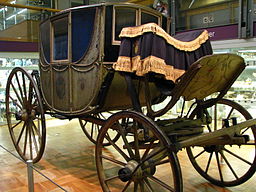
Recently, my family and I relocated from Arizona’s Southwestern Desert to northern Washington. We loaded a moving truck filled with most of our worldly possessions, minus what we sold or gave away, our four younger children (our older two are married and didn’t come with us, unfortunately), and drove across Arizona, Utah, and Idaho to Washington. The entire trip took the better part of three days which seemed terribly long to us as our truck chug-chugged up the hills at about ten miles per hour. I felt like a pioneer of old, uprooting our family and taking a long journey to virtually the unknown in search of a better way of life. Yet, two hundred years ago, such a distance would have been a great deal longer, more difficult, and filled with danger.
During the early eighteen hundreds in England and America, people relied primarily upon horses and oxen to take them long distances. Not only did horses or oxen pulling a heavy load plod along slowly, the teams had to either be changed frequently or allowed to rest. Depending on the roads, or the lack thereof, and the cattle pulling the heavy wagons or horses pulling lighter carriages, and the road conditions and he weather, they could have traveled anywhere from four to eight miles per hour. If they traveled non-stop for eight hours, they covered between thirty to sixty miles a day. But they had to stop to change horses, especially if the load were heavy, and they had to stop for the passengers to eat and, um, make a rest stop. By that calculation, our trip would have taken between two and four months if we had made that trip by wagon. In addition, wagons had breakdowns, horses or oxen could become ill or injured, and travelers were subjected, largely unprotected, to all kinds of weather. Most roads were poorly maintained and were always either very dusty or muddy, which always resulted in the weary travelers arriving “in all their dirt” and craving a wash and a change of clothing.
Some travelers used ships or barges which certainly would have been smoother for the most part than traveling over bumpy, rutted roads. However, travel was limited to rivers and canals. The train had been invented, but was still an untrusted curiosity with very limited railroad system and didn’t, as a rule, appear to be used to carry people’s furniture and household items. So, travel by road in some kind of wagon or cart, pulled by animals was of necessity, the primary method of moving or traveling. It was bumpy, slow, and without air conditioning or heating.
When the aristocracy moved, servants did a great deal of the work, but I’m sure the process of what to take and what to leave was as challenging for them as it was for me. When a house is so laden with memories, it’s difficult to leave it behind. Objects, curios, and even furniture each evokes some kind of memory. I also left behind my two older children. I can’t imagine how I would have done that if I didn’t know if I’d ever see them again. Fortunately, we are only a two-hour flight apart, and they both have plans to visit us with their spouses. Still, it was hard to leave them and give up Sunday dinners and weekend visits.
Though our modern life with all its conveniences and demands have created different lifestyles for us than what our ancestors knew, and many of our customs are different, and our clothing certainly bears little resemblance to fashions of bygone eras, basic human nature really hasn’t changed. The more I research the Regency, the more that basic truth stands out to me. We all love our families, worry about the future, try to make the best of what we are dealt, occasionally do and say things we regret, and look for a better tomorrow. If we are single, we look for someone to love who will love us. If we are married, we work through our challenges and try to keep that spark alive. And we often make difficult choices that bring challenges and heartache in the hopes that it will all be worth it. After all, we are all still looking for our own happily ever after, aren’t we?

Love your website
What a touching article. It is so amazing the things we take for granted. Sending best wishes from the Valley of the Sun, where you are missed.